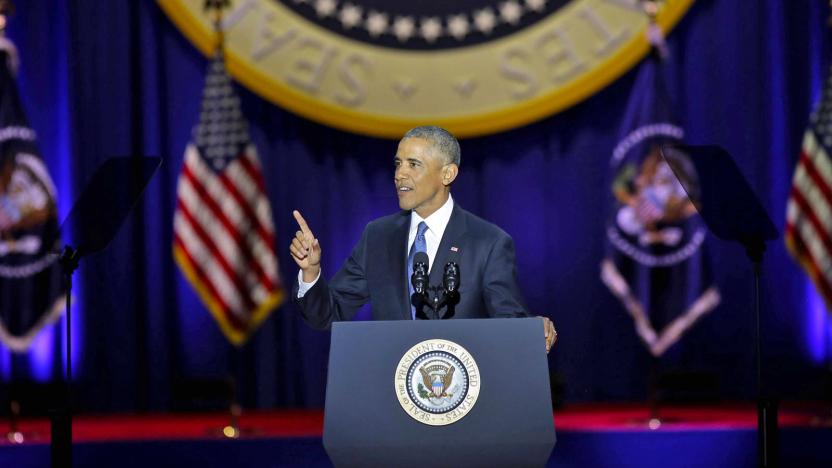freetrade
Latest

Obama talks social media and climate change in final address
During his farewell address President Obama tackled many different issues, from the importance of our democratic institutions and the lingering effects of racism. But he also took a few moments to briefly address the economic, environmental and technical challenges facing Americans of all stripes.

China and the US agree to expand free trade in technology
China and the US may be at each other's throats over a lot of tech-related issues, but that hasn't stopped them from finding some common ground. The two nations have reached a tentative deal that expands the range of devices covered under the free trade-oriented Information Technology Agreement. The updated pact would shrink or eliminate the tariffs on computer storage, processors, GPS units and game consoles, among many other gadgets; it would also scrap import duties on additional hardware, including video cameras.

WTO ruling revives debate over China's rare earths trade
China suffered another setback at the WTO yesterday, thanks to a ruling that could spell trouble for its controversial rare earths industry. In a decision issued Monday, a WTO panel determined that the Chinese government has been acting in violation of international trade rules, due to export restrictions on a number of raw materials. These restrictions, the panel said, allowed Beijing to inflate global market prices, while giving an advantage to domestic producers. As a result, China will likely have to adjust its trade policies to comply with WTO regulations. In a statement, the country's Ministry of Commerce said it "deeply regrets" the decision, but confirmed that the People's Republic will adhere to it. This week's ruling applies to materials like bauxite, coke, magnesium, manganese and zinc, but, most notably, does not apply to rare earths -- a group of 17 elements critical to the production of tablets, smartphones and myriad other gadgets. China has maintained a rather tight grip over the world's rare earths market, thanks to a slew of export controls, quotas and government-erected barriers to entry. The country has come under intense international pressure in recent years, with the US, EU and Mexico filing complaints with the WTO, arguing that China's price-inflating restrictions violate international trade agreements. Beijing, for its part, has long maintained that its export controls are designed to minimize the environmental impact of rare earth mining, while meeting the country's surging domestic demand. It's an argument that's come up a lot during this debate but one that the WTO, on Monday, deemed illegitimate, stating that China has thus far been "unable to demonstrate" the environmental benefits of its policies. The decision won't have any immediate bearing on these policies, but some observers are hopeful that it may be a sign of things to come. Michael Silver, CEO of rare earth processor American Elements, told Reuters that the ruling "confirms the existence of the two-tiered price structure that has caused so much concern," with EU Trade Commissioner Karel De Gucht adding that the decision should force China to remove restrictions on both the aforementioned raw materials and rare earths, alike. Others, however, aren't so optimistic, pointing out that, with a full 95 percent of the rare earths market under its aegis, China could realistically afford to ignore any decisions handed down from the WTO in the future.

European Court: It's free trade for a reason, dummy
Primer: The EU is many nations with a single market, if wine is cheaper in France, a German can simply purchase it there. It's why Apple was censured back in 2007 for territorial iTunes stores that stopped people from shopping around. Anything sold in Europe on a per-country basis hangs within a grey area of free trade. That includes what many call "The Greatest Show on Earth" -- The FA Premier League. Sky, the Premier League's media partner in Europe charges £480 ($740) a month for pub and bar owners to screen their matches in their establishments. That's what prompted cash-strapped publican Karen Murphy to buy a decoder box and card from Greece's Nova company for only £118 ($180) a month. Following a legal challenge that has lasted nearly 7 years, the European Court of Justice has ruled that whilst it's legal (or at least, not illegal) to own a foreign decoder in your own home, it is illegal for pubs and other public spaces to use them on copyright grounds. This means that many home users could snap up cheaper European services and erode the value of Sky's £1bn ($1.5bn) Premier League deal, which would make the greatest show on earth just a little less great.



